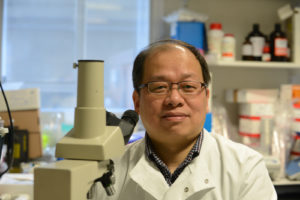 The results of their study, published in the journal Clinical Cancer Research, support the idea that a vaccine – both to prevent pancreatic cancer in people at higher risk of developing the disease and to slow the growth of tumours in patients already affected by the disease – is possible.
The results of their study, published in the journal Clinical Cancer Research, support the idea that a vaccine – both to prevent pancreatic cancer in people at higher risk of developing the disease and to slow the growth of tumours in patients already affected by the disease – is possible.
Vaccines work by training the immune system to recognise and kill pathogens within the body. To do this, immune cells must recognise molecules on the surface of the pathogens, called antigens. By injecting these antigens as a vaccine, the immune system can safely learn how to recognise them, and remember them should they be found in the body again.
While vaccines for some cancers caused by pathogens are already in use, such as the HPV vaccine which prevents the human papilloma virus from causing cervical cancer, vaccination against non-viral cancers has remained a tough challenge.
The UK-China project was led by Professor Yaohe Wang of Queen Mary University of London, whose exceptional research into virotherapy for tackling pancreatic cancer and developing personalised treatments has also seen him secure several PCRF grants for various other innovative projects.
The study, funded by the Chinese Ministry of Science and Technology and Zhengzhou University, used a type of mouse that is prone to developing pancreatic cancer. The research team created a ‘vaccine system’ by taking cells from the mice and turning them into pancreatic cancer cells by introducing errors (mutations) into their genetic code that are known drivers of the cancer. They then infected the cancer cells with viruses which caused them to release antigens that were specific to pancreatic cancer. The virus-infected cancer cells were injected back into the mice, where the antigens they released activated the mouse immune systems – delaying the development of the cancer and doubling the survival time of the treated mice compared with untreated mice.
Although this research is at a very early stage, the researchers believe that the vaccine system could be used to create a personalised vaccine, with patients’ own cells used in a similar way to produce antigens specific to the genetic make-up of each individual.
If you’d like to read more about this exciting project, please see the fuller account published on Queen Mary University of London’s website here.
